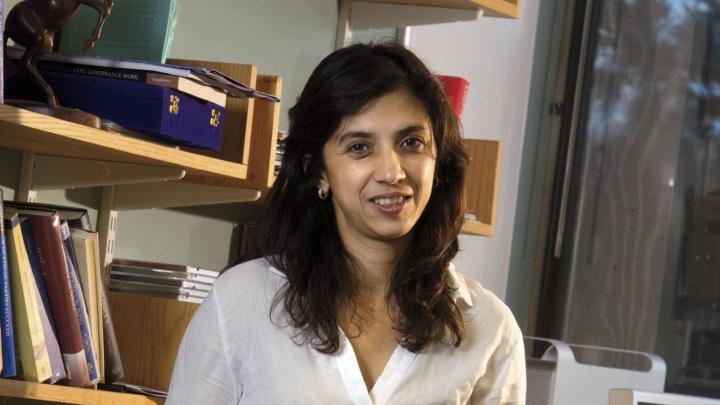You become interested in things you’ve seen a lot of, says Rohini Pande; for her—growing up in India—issues of poverty and gender were “first-order.” The Kamal professor of public policy witnessed protests demanding more women political candidates during her studies at Delhi University; they triggered questions about representation and inequality that still dominate her work. She uses economic approaches to study the design of democratic institutions and regulatory structures, seeking to measure the effect of initiatives like voter information campaigns, microfinance, and market-based mechanisms for environmental regulation. She has found, for instance, that gender quotas in village councils raise local girls’ career aspirations and educational progress. Outside work, she says, “I spend a lot of time climbing, badly.” Her family (her mother is a journalist, her father a public administrator, and her sister a doctor) is from the Lower Himalayas, and Pande began climbing—“more like snow-plodding”—as a child; a recent climb had her clinging to the sea cliffs of Cornwall. She is no stranger to England: the Rhodes Scholar earned a master’s at Oxford and a Ph.D. from the London School of Economics; she arrived at Harvard from Yale in 2006. She returns often to India to conduct field experiments, gathering evidence to shape policy design and implementation as part of the Evidence for Policy Design initiative she co-founded in 2008. The “craft” of a good field experiment, she says, lies in isolating specific effects that speak generally to human behavior. From policies to regulations to elections, “I’m curious to look for explanations that help link the design of a policy to its subsequent impact.”
Harvard Portrait: Rohini Pande

You might also like
Talking About Tipping Points
Developing response capability for a climate emergency
Academia’s Absence from Homelessness
“The lack of dedicated research funding in this area is a major, major problem.”
The Enterprise Research Campus, Part Two
Tishman Speyer signals readiness to pursue approval for second phase of commercial development.
Most popular
More to explore
What is the Best Breakfast and Lunch in Harvard Square?
The cafés and restaurants of Harvard Square sure to impress for breakfast and lunch.
How Homelessness is a Public Health Crisis
Homelessness has surged in the United States, with devastating effects on the public health system.
Portfolio Diet May Reduce Long-Term Risk of Heart Disease and Stroke, Harvard Researchers Find
A little-known diet improves cardiovascular health through several distinct mechanisms.








